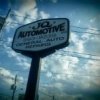Proper oil for Vehicle
-
Available Subscriptions
-
Have you checked out Joe's Latest Blog?
-
By Joe Marconi in Joe's Blog0 commentsIt always amazes me when I hear about a technician who quits one repair shop to go work at another shop for less money. I know you have heard of this too, and you’ve probably asked yourself, “Can this be true? And Why?” The answer rests within the culture of the company. More specifically, the boss, manager, or a toxic work environment literally pushed the technician out the door.
While money and benefits tend to attract people to a company, it won’t keep them there. When a technician begins to look over the fence for greener grass, that is usually a sign that something is wrong within the workplace. It also means that his or her heart is probably already gone. If the issue is not resolved, no amount of money will keep that technician for the long term. The heart is always the first to leave. The last thing that leaves is the technician’s toolbox.
Shop owners: Focus more on employee retention than acquisition. This is not to say that you should not be constantly recruiting. You should. What it does means is that once you hire someone, your job isn’t over, that’s when it begins. Get to know your technicians. Build strong relationships. Have frequent one-on-ones. Engage in meaningful conversation. Find what truly motivates your technicians. You may be surprised that while money is a motivator, it’s usually not the prime motivator.
One last thing; the cost of technician turnover can be financially devastating. It also affects shop morale. Do all you can to create a workplace where technicians feel they are respected, recognized, and know that their work contributes to the overall success of the company. This will lead to improved morale and team spirit. Remember, when you see a technician’s toolbox rolling out of the bay on its way to another shop, the heart was most likely gone long before that.
-
-
Similar Topics
-
By carmcapriotto
Welcome to the Auto Repair Marketing Podcast with Brian Walker. In this solo episode, Brian discusses the importance of taking massive action during slow business periods.
Drawing from a recent conversation with a shop owner, he shares strategies to combat slow times, including leveraging networking groups like BNI, using your CRM effectively, creating engaging video content, and offering incentives.
Brian also highlights the importance of personal health and well-being, emphasizing that a healthy business owner is crucial for a thriving business.
Tune in for practical tips to help fill your bays and keep your business thriving.
Thank you to RepairPal for sponsoring The Auto Repair Marketing Podcast. Learn more about RepairPal at https://repairpal.com/shops
Lagniappe (Books, Links, Other Podcasts, etc)
Greg Buckley at Buckley's Auto Center : https://www.youtube.com/@BuckleysAutoCare/featured
Charlie's Foreign Car
https://www.youtube.com/@fixingcars
Royalty Auto Service
https://www.youtube.com/@theroyaltyautoservice
Dave’s Auto Center
https://www.youtube.com/@DavesAutoCenterCenterville
How To Get In Touch
Group - Auto Repair Marketing Mastermind
Website - shopmarketingpros.com
Facebook - facebook.com/shopmarketingpros
Get the Book - shopmarketingpros.com/book
Instagram - @shopmarketingpros
Questions/Ideas - [email protected]
Click to go to the Podcast on Remarkable Results Radio
-
By carmcapriotto
Thanks to our Partner, NAPA Autotech
Matt Fanslow and guest Tanner Brandt discuss the recent assassination attempt on former President Donald Trump, the state of the country, and the impact of political polarization. They explore how media influences public opinion and the role of political figures in shaping societal views. The conversation highlights the need for civil discourse, critical thinking, and seeking diverse perspectives to counteract the echo chamber effect of social media. understanding in political discussions.
Show Notes
The assassination attempt on Donald Trump (00:01:19) Reactions and media influence (00:03:07) Civil discourse and collaboration (00:06:14) Impact of political polarization (00:09:24) Media influence and party allegiance (00:13:15) The 24-hour news cycle and political leanings (00:17:31) The influence of social media algorithms (00:21:19) Creating echo chambers and misinformation (00:25:11) Social media's impact on the youth and political divide (00:30:17) The need for leadership and setting an example (00:33:24) Raising Respectful Kids (00:34:24) Generational Toughness (00:35:13) Understanding Power Dynamics (00:36:09) Real Life vs. Online Behavior (00:37:36) Media Influence and Perception (00:41:16) Seeking Positive News (00:42:50) Finding a Hobby (00:45:18) Avoiding Politicization (00:49:05) NASTF (00:49:55) Congress Behavior (00:51:15) Congressional Discussions (00:52:32) Ego in Politics (00:55:24) Economic and Social Issues (00:59:02) Interest Rates and Younger Generations (01:00:44) Healthcare and Future Concerns (01:02:24) Local Governance and Youth Leadership (01:05:26) Caring for the Community (01:06:34) Striving for Better (01:07:38) Social Media Impact (01:08:46) Forming Opinions (01:10:06) Media Influence (01:11:14)
Thanks to our Partner, NAPA Autotech napaautotech.com
Email Matt: [email protected]
Diagnosing the Aftermarket A - Z YouTube Channel HERE
Aftermarket Radio Network: https://aftermarketradionetwork.com/
Click to go to the Podcast on Remarkable Results Radio
-
By Changing The Industry
Episode 173 - Handling Online Trolls and Tax Compliance in the Auto Industry with Dan Thieken
-
By carmcapriotto
Thanks to our Partners, NAPA TRACS, AutoFix Auto Shop Coaching, and Today's Class Brin Kline shares his journey from technician to successful shop owner, highlighting the crucial role of his business coach, Bill Haas. They delve into the importance of having an accountability partner, the role of coaching in reducing stress, and how personalized guidance can help shop owners reach their full potential. Perfect for shop owners looking for insights on business coaching, this episode is packed with valuable advice and industry wisdom. Brin Kline, Shop Owner, Assured Auto Works, Melbourne, FL. Brin's previous episodes Bill Haas, Haas Performance Consulting, Bill’s previous episodes HERE. Show Notes
Coaching in the Industry (00:01:15) Discussion about the importance of coaching in the automotive industry and the value of having a coach. Accountability and Coaching (00:07:49) The importance of having an accountability partner in coaching and its impact on business progress. Financial Security and Coaching (00:09:47) The relationship between financial security, goal setting, and coaching in business development. Business Goals and Budgeting (00:11:13) The significance of setting business goals and budgeting with the guidance of a coach. Selecting a Coach (00:13:50) Considerations for selecting a coach based on strengths and weaknesses. Affordability of Coaching (00:16:05) Discussion on the affordability of coaching and the potential benefits, even for struggling businesses. Personal Growth and Coaching (00:18:41) The importance of personal growth, humility, and willingness to change in the coaching relationship. Business changes and profitability (00:20:16) Discussion on increased profitability and the ability to make changes in the business. Gaining confidence and comfort (00:21:19) Becoming more comfortable and confident in making changes and taking action. Transition from technician to business owner (00:25:28) Concerns and challenges of transitioning from a technician to a business owner. Selecting the right coach (00:34:01) Factors to consider when selecting a coach, including industry passion and adaptability. Managing time and involvement in the industry (00:39:08) Discussion on managing time and involvement in various industry activities as a challenge. Team growth and dynamics (00:41:33) Discussion about the growth of Brin's team and maintaining a positive work environment. Commitment to the business (00:44:22) Brin's decision-making process and commitment to his business. Thanks to our Partner, NAPA TRACS NAPA TRACS will move your shop into the SMS fast lane with onsite training and six days a week of support and local representation. Find NAPA TRACS on the Web at http://napatracs.com/ Thanks to our Partner, Auto-Fix Auto Shop Coaching Proven Auto Shop Coaching with Results. Over 61 Million in ROI with an Average ROI of 9x. Find Coach Chris Cotton at AutoFix Auto Shop Coaching on the Web at https://autoshopcoaching.com/ Thanks to our Partner, Today's Class Optimize training with Today's Class: In just 5 minutes daily, boost knowledge retention and improve team performance. Find Today's Class on the web at https://www.todaysclass.com/ Connect with the Podcast: -Follow on Facebook: https://www.facebook.com/RemarkableResultsRadioPodcast/ -Join Our Private Facebook Community: https://www.facebook.com/groups/1734687266778976 -Subscribe on YouTube: https://www.youtube.com/carmcapriotto -Follow on LinkedIn: https://www.linkedin.com/in/carmcapriotto/ -Follow on Instagram: https://www.instagram.com/remarkableresultsradiopodcast/ -Follow on X (Twitter): https://twitter.com/RResultsBiz -Visit the Website: https://remarkableresults.biz/ -Join our Insider List: https://remarkableresults.biz/insider -All books mentioned on our podcasts: https://remarkableresults.biz/books -Our Classroom page for personal or team learning: https://remarkableresults.biz/classroom -Buy Me a Coffee: https://www.buymeacoffee.com/carm -The Aftermarket Radio Network: https://aftermarketradionetwork.com -Special episode collections: https://remarkableresults.biz/collections
Click to go to the Podcast on Remarkable Results Radio

-
By carmcapriotto
Thank you to our friends at RepairPal for providing you this episode. As shop owners we were part of RepairPal’s Certified network and you can learn more at RepairPal.com/shops.
Show Notes
How we met - Chamber + Locally Owned Tangi during Covid Megan’s story - what got her into Promo Products Your automotive dealership background experience Why promo products? Your favorite promo product story? Your top tips for choosing promotional products Why work with a promo product agency rather than going straight to Vistaprint, Imprint, or other online retailers? Let’s talk set-up and other fees. One shop owner asked why do I have to pay setup fee every single time if the file is already there? Another note/comment from a shop owner: how can they touch/feel/see before buying? Really looking for a company to display at our trade shows. How can we make this process of selecting/buying promo products easy? Any promo product pet peeves you have? Last words….
How To Get In Touch
Group - Auto Repair Marketing Mastermind
Website - shopmarketingpros.com
Facebook - facebook.com/shopmarketingpros
Click to go to the Podcast on Remarkable Results Radio
-
-
-
Similar Tagged Content
-
- 3 replies
- 1,214 views
-
- 2 replies
- 1,091 views
-
- 1 reply
- 3,045 views
-
- 3 replies
- 2,102 views
-
- 10 replies
- 3,278 views
-
-
Our Sponsors

















Recommended Posts
Create an account or sign in to comment
You need to be a member in order to leave a comment
Create an account
Sign up for a new account in our community. It's easy!
Register a new accountSign in
Already have an account? Sign in here.
Sign In Now